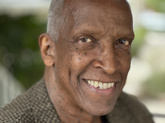The Notebook Adapter Bekah Brunstetter Tried to Hide Inside a Big Musical But Got a Tony Nomination Instead

(Photo by Sergio Villarini for Broadway.com)
The Notebook is aware of its reputation. Hence its winking decision to sell branded tissue boxes at the Schoenfeld Theatre (a souvenir that’s both practical and clever). Imagine the pressure on Bekah Brunstetter, a seasoned playwright but first-time librettist, responsible for the bones of a musical whose emotional impact has been prescribed by the merchandise. And when a weepy patron is the mark of success, an artist is aiming at a moving target. After all, Brunstetter says all too knowingly, “People have such different tolerance levels for sappiness.”
At this point, she could write a dissertation on the subject, with Emmy nominations as a producer on the first three seasons of NBC’s tear-jerking drama series This Is Us, and now, a Tony nomination for The Notebook. If sentiment is drama’s most overpowering ingredient, Brunstetter has proven herself to have a deft hand and a delicate palate. The key, she shares, are all the bitter-sour-salty flavors that balance the sweetness, though she prefers not to think of it like a recipe for emotional manipulation. “I hate talking about this like it's a device because this is how I see the world. We’re wrestling with something really complex and f**ked up. Then let's laugh about it,” she says plainly. “It's a way to take an audience on a journey, but to me, it's also just kind of what life is like.”
"People have such different tolerance levels for sappiness." –Bekah Brunstetter
Those mini-catharses are sprinkled all throughout her script for The Notebook, a version of the Nicholas Sparks romance that doesn’t shy away from the dark particulars of dementia and the complexities of Allie and Noah’s relationship in their older years. “We set out from day one to refocus this story on the older characters and give them more space and more weight than they get in the book or the movie,” Brunstetter explains. “To have it be not just a young love story, but a story about getting older and being in the end of your life.” Naturally, the show still has young, beautiful people falling in love and frolicking in the rain—four of them in fact, with two pairs of actors playing out Noah and Allie’s courtship years (John Cardoza and Jordan Tyson as the youngest pair, and Ryan Vasquez and Joy Woods landing in the middle). The triptych, however, coalesces in the oldest pairing—vessels for all the iterations of self that amount to a life well lived. In another subtle nod of recognition for Brunstetter from the Tony committee, Dorian Harewood and Maryann Plunkett who play the older couple were the two actors plucked from the cast for performance nominations.

(Photo by Jenny Anderson for Broadway.com)
Still, Brunstetter unfailingly speaks about The Notebook in terms of “we," redirecting praise toward her collaborator Ingrid Michaelson, whose score was snubbed by nominators but whose fingerprints cover every inch of the show. Pick out a line of dialogue and there’s a good chance Brunstetter will credit Michaelson with a casual “I feel like that was her” or “I think she actually said that line.” Then, with a “who knows,” she’ll shrug off the entire debate. Every ounce of preciousness is directed toward the finished product, not quibbling about who should lay claim to it.
“Ingrid and I were so in each other's heads,” she says of the writing process. “We both like the funny-sad worlds, so from the beginning, our brains and our hearts were very aligned in terms of what we wanted to make.” Brunstetter's also sure to give directors Michael Greif and Schele Williams their due for ushering along a pair of novice musical theater writers. “It being our first time,” she says of herself and Michaelson, “that's when we kind of entered the graduate program of musical theater writing. I truly feel like I got a master's degree just from studying Michael and Schele.” (Brunstetter herself was raised on a musical theater diet of Fiddler on the Roof, The Sound of Music and Ragtime: “Fifty-percent of my brain is “Sarah Brown Eyes,” she says).
She doesn’t hide her discomfort being the sole creative team member representing The Notebook at the Tonys—an ironic twist considering that one of the biggest attractions of a musical project was her ability to hide behind a score. “When I have a play that's mine, there's a lot of pressure on me as the playwright to speak for every moment. The playwright is the God of the world,” she stresses. “I love being the book writer because it's not totally up to me. I love blending into that collective.” In fact, she defines the book writer’s job as being as inconspicuous as possible. To an audience, she argues, “The book shouldn’t exist. You want it to be invisible and get to the songs.”
And yet, having previously been shrouded by writers’ rooms or functioning as playwright-God in the safety of smaller venues, this is the most visible moment of Brunstetter’s career. “I come to playwriting from the off-off-off-off world where you're funding it yourself and you're doing it with your friends and you're just trying to tell a story and hoping 10 people come,” she says. “I've written for a few shows that have gotten nominated for Emmys, so I've kind of seen that part of the world. But it’s very wild to me that it does all happen with this level of press and attention.”
That ongoing experience of surprise may very well be what has allowed Brunstetter to resist the influence of the metaphorical tissue box—sticking to her own creative vision and artistic interests for a property primed for fan service.

There are shadows of The Notebook in her 2016 play, Going to a Place Where You Are Already, inspired by interviews with her own grandparents about death and the afterlife. “Two of them were Christians and two of them were atheists. I just talked to all of them about where they thought they were going to go after they die, and I wrote a play based on those conversations.” Aptly, the questions “Where do I go?” and “Where do we go?” are the refrain of Plunkett’s one song, “I Know”—perhaps a symptom of the Michaelson-Brunstetter mind meld.
The thematic and structural overlaps with This Is Us—a story told in multiple timelines—are also noticeable, though she argues, not the product of any conscious choice. “Because this is a piece of musical theater, not an episode of television, we were constructing it differently,” she says. Still, she doesn’t rule out the possibility that some unconscious influence worked its way in. “I can't remember a time where I was working on The Notebook thinking, ‘That's kind of like what we did on that episode of This Is Us.’ But in retrospect, of course.”
She’s also grateful to have avoided one particular point of intersection (This Is Us spoiler alert): “Mandy Moore's character ends up getting dementia and passing away later in the series,” she explains. “I had just started working on The Notebook and remember thinking, ‘Oh my gosh, these two worlds are going to collide so hard.’” Fortunately, she stopped writing for the show by the time that plot point came around. “I would've literally been going from Allie dementia to Rebecca dementia and trying to compartmentalize the two"—a prime example of Brunstetter's sense of humor.
"I think it's really interesting how we evolve—but also don't." –Bekah Brunstetter
“I just love to write about older people,” Brunstetter emphasizes. “I think it's really interesting how we evolve—but also don't.” Thinking about her own evolution, she’s seen her confidence rise and insecurities recede over the years, something she largely attributes to becoming a parent to a now-one-year-old daughter and three-year-old son. “It really shifts your priorities and makes you kind of give less sh*ts about the things that used to really terrorize you,” she says.
She spent the rehearsal period for The Notebook traveling between New York and Los Angeles where she lives full time. Her son, she notes, mostly understands her job. “He knows that I work on a play where people sing, and he knows Ingrid. We listen to her music a lot around the house when we're making dinner.” Those are also the moments she tends to check in on The Notebook’s Instagram account where she can see the comments and stories from fans of the show. “I just stand there for a minute and click through,” she says. “It's really meaningful to me to hear from the people every night who are seeing it. I like being able to participate in that way from my kitchen across the country.”
It’s a small demonstration of the quality Brunstetter considers the most persistent, non-evolving piece of herself. “I want that pat on the head,” she says, defining the validation she's looking for in terms of proof from an audience that she did what she set out to do as an artist. “I want to connect with people—and make them laugh—and make them think.” Curiously enough, "make them cry" is not on the list.







